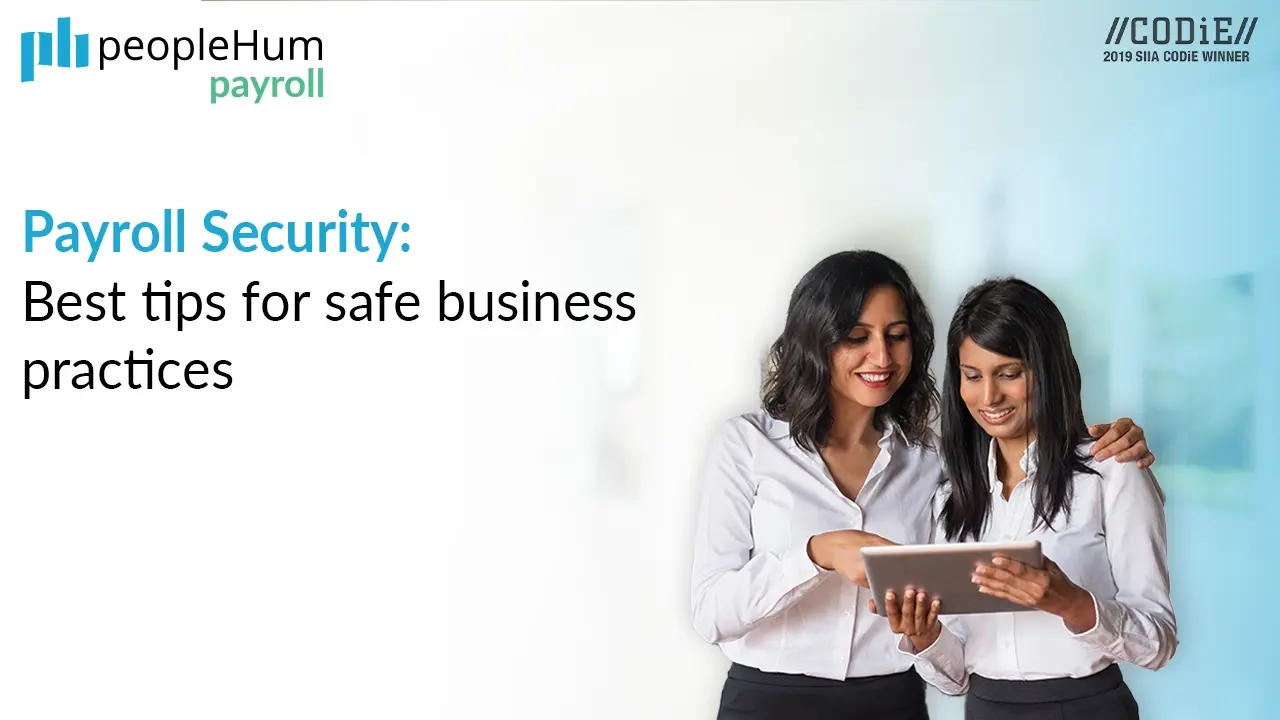As data breaches become increasingly common, ensuring the security of payroll systems stands shoulder to shoulder with the crucial task of timely employee payments. It’s not just about processing payments; it’s about honoring the trust employees place in their organization’s ability to safeguard sensitive data. A data breach, often a result of overlooked security measures can have serious consequences. Apart from the breaching of data, there is always a fear of not being compliant with the regulations as per norms and the regrettable lofty fines that come along with it. Neglecting payroll data security could mean facing severe penalties, hence.
In this blog, we will be answering questions like: How to navigate through HR software when it comes to payroll security? What steps can organizations take to fortify their defenses and shield payroll data from potential breaches or unauthorized access? How can we proactively prevent the loss or compromise of vital payroll information? The pressing queries that demand practical and strategic answers to ensure the safety and confidentiality of payroll data are laid below.
What are the common payroll security risks?
Safeguard your payroll data and build a fortress to defend your payroll against three formidable adversaries.
Common payroll security risks and their impact:
In the intricate world of payroll management, safeguarding sensitive data is paramount. Let's delve deeper into the lurking threats that can potentially jeopardize an organization's financial stability and reputation.
1. Fines and penalties: Non-compliance with data regulations
In India, failure to comply with data protection laws, such as the IT Act, can result in substantial penalties. According to the IT (Amendment) Act, 2008, non-compliance may lead to fines up to ₹5 crore. Ensuring compliance with these stringent regulations is critical to avoid severe financial repercussions.
2. External data breaches: A constant menace
The rise of cyber threats in India is undeniable. According to a report by CERT-In, there was a staggering 50% surge in cybersecurity incidents in 2020. External data breaches pose a significant risk, potentially exposing sensitive payroll information to cybercriminals. Such breaches can significantly dent an organization's credibility and financial health.
3. Internal payroll fraud: The silent threat
Beyond external risks, internal vulnerabilities exist too. Insider threats account for a substantial proportion of cyber incidents in India. According to PwC India, insider threats contribute to 34% of cybersecurity breaches. Instances of payroll fraud, whether intentional or unintentional, could lead to financial losses and tarnish an organization's integrity.
Securing payroll data isn't just about compliance; it's about safeguarding the organization's financial stability and integrity. Mitigating these risks demands a multifaceted approach—strengthening internal controls, implementing robust security measures, and fostering a culture of vigilance and accountability. In doing so, organizations can fortify their defenses against potential threats and ensure the sanctity of their payroll systems.
Payroll security tips: How do you secure payroll?
Securing payroll is paramount in safeguarding sensitive information. Threats to payroll systems could lead to substantial financial losses and tarnished reputations. By fortifying defenses through these comprehensive measures, you can effectively shield your organization from potential security breaches.
1. Keep updating your payroll software
In today's digital landscape, where every click and keystroke holds significant value, the upkeep of your payroll software is akin to maintaining a sturdy fortress. It's not just about paying your employees—it's about fortifying your defenses against evolving cyber threats and ensuring the security of sensitive financial data.
Keeping your payroll software updated acts as a formidable shield against cyber threats. In India alone, cybercrimes surged by a staggering 291% in 2020, emphasizing the urgent need for robust security measures. Regular updates mitigate vulnerabilities, reducing the risk of potential breaches or data compromises.
India's regulatory landscape, including the Goods and Services Tax (GST) and the Income Tax Act, undergoes frequent updates. Aligning your payroll software with these changes ensures compliance with updated regulations. Failure to comply can result in hefty penalties, with penalties for GST non-compliance ranging from ₹10,000 to 18% of the tax due.
Updated software often comes with improved features and functionalities. This translates to streamlined processes and enhanced efficiency in managing payroll tasks. A study by the Federation of Indian Chambers of Commerce and Industry (FICCI) revealed that organizations leveraging updated software witnessed a 30% increase in overall productivity.
Outdated software can lead to inaccuracies and inconsistencies in payroll calculations. This not only impacts employee satisfaction but also poses risks in financial reporting. Maintaining updated software ensures data integrity, reducing errors and fostering trust in your payroll processes.
Adapting your payroll software to the latest technology trends equips your business to handle future challenges. Embracing digital advancements such as cloud-based solutions or AI-driven payroll analytics lays a robust foundation for scalability and innovation.
2. Arm your entire team with comprehensive training
Focus your teams on mastering the intricacies of your payroll system. These training sessions should extend beyond mere functionality, delving into the system's security features. It's crucial that your staff comprehends the significance of protecting sensitive data, like Social Security numbers and addresses, within the system. Consistently updating their knowledge and skills as systems evolve ensures they remain adept at tackling evolving threats and challenges.
Studies show that 95% of cybersecurity breaches result from human error, making comprehensive training crucial in safeguarding sensitive payroll data.
Empowering your workforce through comprehensive training sessions elevates their awareness regarding the significance of data security within the payroll system. It not only equips them with practical know-how but also instills a proactive mindset to safeguard sensitive information from potential breaches or unauthorized access.
Research indicates that companies that prioritize continuous employee training and education in cybersecurity reduce the risk of successful cyberattacks by 70%.
Regularly updating their understanding of the system's security measures aligns your team with the latest defense strategies against evolving cyber threats. This continual education ensures your workforce remains vigilant, contributing significantly to fortifying your payroll system's defense mechanisms against potential vulnerabilities.
3. Restrict outside access in your payroll systems
In India, cybercrimes surged by a staggering 291% in 2020, underscoring the critical need for stringent data protection measures. Restricting access to your payroll system is akin to fortifying your digital fortress against potential threats. It's your frontline defense against unauthorized access.
4. Payroll security while onboarding and offboarding
Incorporating payroll security into the onboarding and offboarding phases is more than just a procedural step. This step helps you weave a protective shield around sensitive financial data as employees enter and exit the organization.
When a new member joins the team, you don’t just hand them an ID card. You also need to ensure that their access to critical systems is as secure as can be. Thoroughly vetting new hires before granting them access to sensitive payroll systems becomes crucial. After all, in today's world, where cybersecurity threats lurk around every digital corner, a cautious entry into these systems safeguards against potential risks.
Similarly, when it's time to bid farewell to departing colleagues, closing the digital doors they once had access to would be beneficial. Revoking their logins and credentials on their last working day ensures a seamless transition while closing the door on potential security vulnerabilities too. It's an essential part of ensuring that the organization's sensitive financial data remains secure and shielded from unauthorized access.
Integrating payroll security into the onboarding and offboarding processes, organizations proactively fortify their defenses against internal security threats by minimizing potential risks and upholding the integrity of payroll data in an ever-evolving digital landscape.
5. Monitoring access logs and suspicious activity
Within a payroll system, recording and documenting the entry of everyone who enters and exits within the company serves as a digital footprint—a record of daily activity in the logs. Regularly scrutinizing these logs is akin to a vigilante surveying the logs for any signs of breach. If something seems amiss, perhaps an unusual login or access pattern, immediate measures can be exercised. Monitoring the payroll security becomes paramount to prevent any unauthorized entries and keep a vigilant eye on these logs. Using a continuous compliance solution can help you consistently monitor your security standpoint and keep up with industry best practices.
6. Implementing the segregation of payroll duties
This serves as a shield against potential tampering within the system—an extra layer of defense to uphold the integrity of financial records.
By dividing payroll responsibilities among multiple individuals, it's akin to ensuring no one person holds the keys to the entire vault. Each task is cross-checked by another team member, forming an internal system of checks and balances.
This collaborative approach isn't just about splitting tasks—it's about cultivating a culture of accountability and transparency. When employees know their actions undergo scrutiny, they're less inclined to attempt any alterations. It's akin to having multiple guards staged to fortify the treasure vault—everyone knows that they are being watched and no one goes beyond detection.
7. Strict protocols for data access
Establishing stringent protocols for accessing payroll data serves as a shield against potential breaches—an essential step in safeguarding sensitive financial information.
Consider it akin to setting up security checkpoints at the entry gates. While external requests to access payroll data might not be an everyday occurrence, each inquiry poses a potential vulnerability. Therefore, having clear and specific protocols for managing these requests becomes crucial.
Imagine it as laying down the ground rules for anyone seeking access to the treasure vault. These protocols detail the procedures to follow—requiring all requests for payroll information to be documented in writing. It's like having a guard stationed at the gate, allowing entry only to those authorized to enter.
Establishing such stringent access protocols isn't just about maintaining order, it's about fortifying defenses against potential breaches. By setting clear guidelines, organizations create a secure fortress around their payroll data, ensuring that access remains restricted to authorized personnel only.
Conclusion
Unfortunately, even smaller businesses face the looming threat of payroll fraud. However, there are effective measures to fortify your defenses against such risks by combining reliable payroll software with best-in-class practices. This fusion is pivotal in safeguarding your company's sensitive information.
Shielding your organization against potential fraud is more a matter of protection, like maintaining the smooth flow of day-to-day operations and preserving your financial stability. Embracing solutions tailored to fortify payroll security becomes essential in mitigating these risks.
Consider opting for specialized payroll services like peopleHum Payroll, meticulously designed to meet your specific payroll security requirements. Employing such services acts as an added layer of defense, ensuring that your payroll remains safeguarded from potential threats that could disrupt your business's rhythm and impact its financial health.




































![Top 50 Human Resources statistics [2024]](https://assets-global.website-files.com/62d84b3d3ba446b2ec041a19/65967fbf345fe54d2b68bc87_Top%2050%20Human%20Resources%20Statistics%20%5B2024%5D%20copy.webp)













